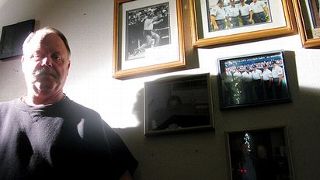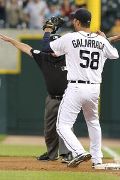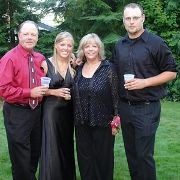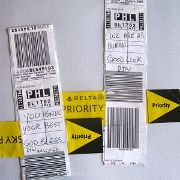|
Editor's note: This story on Armando Galarraga's almost-perfect game was originally published on Jan. 5, 2011. Today is the 10-year anniversary of the game. PORTLAND, Ore. -- Jim Joyce's garage smells of old cigarettes and motor oil. It's early December, and he is at home playing solitaire on his laptop, which sits on a folding table that doubles as a desk. The wafting odor belies the comfort that the two refrigerators, flat-screen TV, Harley, bunny rabbit, countless Winston Light cigarette butts and solitude provide. The space has become a necessary refuge for the man whose action on the night of June 2 -- and reaction -- brought instant fame.  "What normal used to be," Joyce says, "isn't normal now." Seven months ago and 2,400 miles away, the veteran Major League Baseball umpire cost Armando Galarraga a perfect game in Detroit. And every day, something trips Joyce's memory about his devastating mistake and the subsequent fallout: from the death threats he and his family received and the security team that greeted him on every road trip to the piles of heartwarming e-mails and letters saved by his wife of 28 years, Kay. "I want us to remember," Kay says, as her hands smooth over the plastic casings of scrapbooks holding the correspondence. But what if the memories only reinforce what Joyce calls the biggest mistake in umpiring history? What happens when one action not only annihilates a career-long, concentrated effort at invisibility and accuracy but also wholly contradicts it? What happens when you're Jim Joyce and you try to resume your normal life? "I think about it still, almost every day," Joyce says. "I don't want to be known as Jim Joyce, the guy that blew the perfect game. But I think that's inevitable." Why? "Because I'm Jim Joyce," he says, "the umpire who blew the perfect game." He is sure he got it right. Positive.The three-game series is nondescript; it starts on a Tuesday, during the first week of the month, and features the Cleveland Indians and Detroit Tigers, two teams that would combine for 174 losses by season's end. As is always the case when Joyce works in Detroit, he stays at his childhood home about an hour away in Toledo, Ohio, with his 86-year-old mother, Ellouise. The trip is Joyce's first assignment in Detroit since his father's death a year earlier. Ahead of the series, he and Ellouise visit his dad's grave. An avid baseball fan, Jim Joyce Sr. loved Ted Williams and umpired amateur games. He worked in management at a local Jeep factory his entire life; Jim Jr. even worked there for a time after graduating from Bowling Green, where he pitched for four years. On Tuesday, Joyce worked second base. Tonight, he's at first base. The game is speeding by -- it's the eighth inning and not even two hours have passed. The 17,000 fans in the park know Detroit's Galarraga is throwing a perfect game. By the ninth inning, they're on their feet, readying for the 21st perfect game in major league history. Joyce had witnessed such history just a few weeks prior, when he worked second base for Oakland pitcher Dallas Braden's perfect game. He knew Braden had a perfect game as it was being thrown, just as he knew -- sometime around the seventh inning -- that Galarraga had one going, too. The ninth starts with a first-pitch fly out. Four pitches later, Joyce makes the call at first base on a weak grounder to shortstop. One more to go. Joyce knows he's ready. Twenty-three years' experience brings such confidence that Joyce treats each pitch as routine, but the refrain -- "just don't be the one to miss the call" -- runs through his mind, too.  Just like that, Indians shortstop Jason Donald -- the final out -- is running down the first-base line like a scared deer. Joyce is thrown by how fast he is running -- in Joyce's mind, players don't run all that hard on a groundout to end a game. Even so, if it's close, Joyce thinks, the runner will probably be out. Joyce moves slightly to his right and zones in on the bag. Marvin Hudson, the plate umpire, is following Donald up the line, but his view is restricted; Joyce is in perfect position to make the call. As Donald gets to the bag, Joyce splays his arms outward. "Something just instinctually, instinctively, told me he was safe," Joyce says. And he is sure he got it right. Positive. Hudson thinks Joyce got it right, too, and tells himself, simply, "Well, there goes the perfect game." But when Detroit players start yelling from the dugout a few moments later, experience tells Joyce they saw the replay and are probably right. Yet Joyce's confidence doesn't waver. Another ground-ball out at first, this time routine, and the game is over. As Joyce runs off the field, Tigers veteran manager Jim Leyland approaches Joyce. "Jimmy!" Leyland barks. "You blew it! You blew it, go look at the video!" Boos cascade from the stands as Joyce walks back to the umpires' locker room, telling himself over and over that he hopes he got the call right. He asks the locker room attendant to cue up the replay. By the time Joyce reaches the changing area, he's now yelling, "I hope I got it right! I hope it got it right!" His colleagues, crew chief Derryl Cousins, Jim Wolf and Hudson, don't say a word. Before seeing the replay, they surround Joyce by his locker. Joyce turns to Cousins and asks whether he made the correct call. Cousins pauses, then says, "I think he was out, Jimmy." Joyce throws his hat, rips off his shirt and pants and paces the room, yelling and cursing. He then watches the replay -- the only time he's seen it -- and rages more. "He was beside himself," Hudson says. "I felt tremendously bad for him." Death threats, tears and decisions that transform a mistakeBack in Oregon, Keri Joyce, Jim's 21-year-old daughter, returns home from a restaurant to an inbox full of Facebook messages. Many are offering support, but at least two dozen are nasty. Some are worse.  "I hope your dad drinks himself to death," one reads. One message threatens to burn her family's home; another wishes her AIDS. Jim's son, Jimmy, receives death threats, too. Keri is shocked, but she also is angry. Later, she posts a status update on her page: I love my dad. You a------- who can't realise he's a human can f--- off. In Detroit, unaware of what his children are being subjected to, Joyce's actions and words begin to alter how his mistake will be remembered. He chooses to give the media rare access to the umpires' locker room. He takes full responsibility for kicking the call. When the media leave, Leyland comes in for a beer. He tells Joyce that he blew the call and that he needs to move past it. Tigers general manager Dave Dombrowski visits, too, concerned for Joyce's well-being. Both men have known Joyce for decades and, like the players in the league who voted him the top umpire in an ESPN The Magazine poll, hold enormous respect for him. Joyce appreciates the gestures, but his mind is on one person. He asks Dombrowski whether he can talk to Galarraga. Dombrowski leaves, and a few minutes later he returns to the umpires' room with the 28-year-old pitcher from Venezuela. Galarraga walks up to Joyce and while hugging him says, "We are all human." Joyce, crying, apologizes in English and Spanish and then leaves the room, unable to speak. "I can't even explain the feeling, because there are no words," Joyce says. "It's almost worse than my dad's death. That's how bad I felt." Kay, at home in Oregon with their three dogs, has yet to talk with Joyce but is crying, too. She knows how hard her husband will be on himself. She watched the game on TV, blurting, "No, Jimmer, no!" when she saw him make the call.  The phone rings. MLB security is promising a local police patrol outside the house. Kay says she's fine; she worries about her kids, she worries about Jim. When Jim leaves the ballpark and drives to his mother's house in Toledo, the first call he makes is to Kay. She tells him, whatever you do, as soon as you get to your mom's house, just delete your Facebook account. She tells him their grown children are receiving death threats. Joyce's cell phone is stuffed with voice mails and texts. His mother, however, is unaware of what has occurred. The two sit in the living room, and Jim tells his mom he made the biggest mistake of his life. The local news recaps the play, and as his mother watches it for the first time, he turns his back, hearing but not seeing his mistake. "That was you?" she asks him. "Why are they so mad at you?" Ellouise eventually goes to sleep. Joyce deletes his Facebook account without looking at it. He tries to sleep at 5, and closes his eyes for about 30 minutes. He later leaves for Comerica Park. It's the final game of the series, a day game, and Joyce will work home plate. Joyce's routine on game day is to be the last umpire to walk out of the tunnel. But today, he doesn't want the focus of being last out. "I didn't want it to appear like I was making an entrance," he says. "I was kind of hoping I'd just blend in." On the way out, Joyce's steps are a bit slower; he's listening for the crowd reaction. He thinks he hears boos, he thinks he hears cheers. Tears are welling in his eyes. (Joyce likes to remind people that he's Irish; he's emotional and he can't help it.) He gets to home plate to exchange the lineup cards, and that's when Galarraga appears out of the dugout. The crowd stands and applauds, and when Galarraga hands Joyce the lineup card, Joyce can't even read it, the names a fuzzy blur through the tears. The images from that moment, captured live and broadcast across the country, will change how Galarraga and Joyce will be remembered. 'Nobody feels worse than we do'On Friday morning, when he leaves Detroit for his next assignment in Philadelphia, Joyce has a police escort through the airport. He walks by a restaurant and sees every television tuned to "SportsCenter," showing his face. The cop alongside him says, "You better get used to it."  When he arrives in Philly, he retrieves his luggage and discovers notes on the luggage tags: "We are all human -- Good Luck" and "You gave your best God Bless." They are signed: "DTW baggage." Joyce carefully takes them off his bags and places them in his briefcase. He carries them with him for the rest of the season, careful not to check them in case his luggage gets lost. Hundreds of similar notes, e-mails, cards and letters are sent. Children from an elementary school in upstate New York each write a note telling Joyce how they admired his ability to "man up" and take responsibility for his mistake. Clergy, judges, a Secret Service agent and strangers from around the world write. One person creates his own "Certificate of Appreciation," prints it and sends it along. Two major league pitchers write notes expressing their respect. Ex-classmates and teammates and long-ago friends say they always knew Joyce to be a person of integrity. A baseball chaplain sends Joyce his own engraved Bible; a boy with cerebral palsy writes the night of the game, encouraging Joyce to not belabor his mistake. The boy and Joyce would meet in person later in the summer before a Rays game in Tampa Bay and still e-mail regularly. Front-office executives, current and former, e-mail Joyce in support, as do MLB executives. Bob Delaney and Steve Javie, veteran NBA referees, send along e-mails, as do NHL ref Tim Peel and NFL official Carl Cheffers. Peel, a 13-year veteran, says he doesn't know Joyce personally but felt compelled to reach out. "I can sympathize," Peel says. "When we miss a call in a game, nobody feels worse than we do." But an e-mail from Mark Wunderlich, another veteran NBA ref, is one of the most compelling: I have admired your work for years and I have been thinking about you the last couple of days. Last season in the Play-Offs I missed a take foul in Dallas in the Conference Finals that cost a team a game and had a few sleepless nights that I'm sure you're familiar with. These are difficult times that only umpires and refs know. It shall pass and the only thing people will remember is the class you showed during this time. From one professional to another, I'm proud of you buddy. The messages weren't all positive, though. A letter with a return address was forwarded by MLB to Joyce in late June when Joyce was in Houston. After arriving at his hotel, he opened the letter, which read, in part, the next time Joyce was in Texas, "you will be shot." The people at MLB thought, not illogically, that a death threat letter would never include a return address, so off it went in a package with other correspondence. Joyce says he was told the FBI visited the author. Kay kept the death threat, has it sealed in plastic. It's there in the scrapbook just like all the others, just like the luggage tags. Still looking for meaningWhen the weather is nice and it isn't raining, Joyce takes his Harley out of the garage. He rides when he can, rides because it's fun, because it's freeing, and it's something to do. Joyce, who's 55 years old, thinks about his mistake every day. It isn't just the luggage tags and the notes and the e-mails that remain as reminders. It's also when he's out in public. A few weeks before Christmas, he and Kay were shopping at a toy store when Joyce noticed a man following him down each aisle.  Finally, the man sheepishly approached and asked whether he was the umpire. He wanted to shake Joyce's hand and thank him for his integrity. Platitudes about sportsmanship, honesty, character, integrity, perfection and imperfection likely will follow Joyce and Galarraga to their epitaphs. Galarraga's instant reaction -- that memorable wry smile after the call -- and shrewd recognition later that the blown call and the aftermath made him more famous and generated more good than a perfect game would have -- changed both men. "A lot of positive has come from this," Joyce says. "And I can't say enough about how Armando handled this. The positive has helped offset the negative that came with making the mistake. Unfortunately, you can't have one without the other." MLB officials suggested Joyce might benefit from seeing a therapist. But Joyce says his therapy comes in discussions with his wife. He also relies on a sense of humor. He still laughs about the fan in Detroit the day after the blown call who held a sign behind home plate with a photograph of blind musician Stevie Wonder that read "Today's umpire is ... " Even so, Joyce wrestles with negotiating his new identity. "I wish I was still invisible, I really do. I wish that I could go back to being the old Jim Joyce, that this didn't happen ... and that everything was normal, and I know that's not going to happen." Kay has watched his struggle. When Joyce first returned home this season, he was spending much more time alone in the garage. Normally an outgoing, lively person, he retreated. When they went out in public and saw friends, it was agonizing, because he knew friends were acting differently; he knew they didn't know what to say. "What do you say?" says Katy Robinson, a close family friend. "What do you say to someone who's just been through something like that?" It was not until after the World Series ended that Kay noticed he started to change. Joyce spent less time alone in the garage, his refuge. "He came out of his shell," Kay says. "I think he thought, 'OK, I can go out now, baseball is over.'" In just a few weeks, it will be back. Joyce will return to umpiring games during spring training. He says he'll be a bit nervous, not sure what to anticipate. He's still trying to make sense of it all. He says there must be some larger meaning for all of this, but he's not yet certain what that is. What Joyce does know is that for him, the word "perfect" means something entirely different now. "It means one guy was, and one guy wasn't. I happen to be the guy who wasn't. ... But what does the word 'perfect' mean? Sometimes the word 'perfect' means be able to accept imperfection."
|
